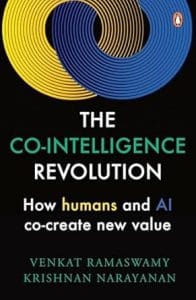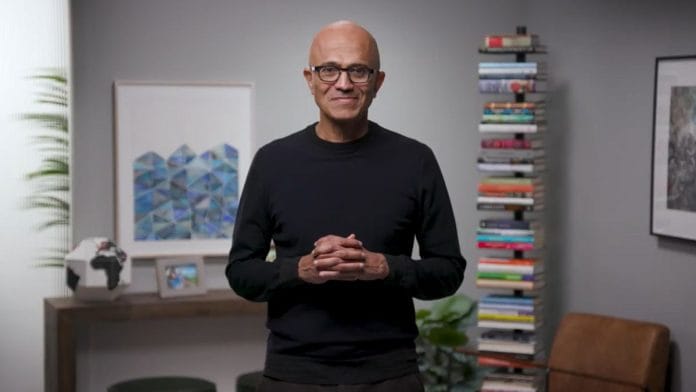Microsoft, in the last decade under the leadership of its chairman and CEO, Satya Nadella, has become one of the defining enterprises of the co-intelligence era—from its roots in desktop computing to hyperscale computing, providing access to compute infrastructure and software as a platform, offering service-as-a-capability to its customers and partners, all the while transforming its own portfolio of businesses and the future of work in the process.
Let us explore how its own SDI platforms, whose capabilities it offers as a service and infuses in its offerings to customers and partners, and its own co-intelligence architecture have evolved in the past few years.
The Copilot Era
Nadella argues that two technological breakthroughs have come together to define this new era of AI—natural language as a universal interface to any computer and the emergence of a reasoning engine that has the capability to analyse and intelligently interpret vast amounts of available data:
Just like you boot up an OS (operating system) to access applications or use a browser to visit websites today, our belief is that you will invoke a Copilot to do all those activities and more: to shop, to code, to analyze, to learn, to create… Copilot will be the new UI that helps us gain access to the world’s knowledge and your organization’s knowledge.
Microsoft’s first commercially successful integration of ChatGPT and other LLMs in their software offerings was with GitHub Copilot. Nadella shares the aha-moment of its experimentation in a Freakonomics Radio interview: ‘Once we got to GPT-3, when it started to learn to code, we said, “Oh wow, this emergent phenomenon, the scaling effects of these transformer models, are really showing promise.”’
Also read: These are the Bengaluru startups bringing AI and farmers together
Microsoft took it to Nat Friedman, CEO of GitHub, a developer platform they acquired in 2018. Friedman and team created GitHub Copilot, a new AI pair programmer that helps developers write better code. Friedman, an amateur pilot himself, uses a flight analogy to describe it: ‘The tool was more like a copilot—someone who joins you in the cockpit and makes suggestions… Usually you listen to a copilot, sometimes you ignore him.’
GitHub Copilot uses the OpenAI Codex engine to suggest code and entire functions in real time, right from the developer’s editor. Trained on billions of lines of code, it turns natural language prompts into coding suggestions across dozens of languages. It shares recommendations based on the project’s context and style conventions. Developers can quickly cycle through lines of code or complete function suggestions and decide which to accept, reject, or edit.
A recent analysis of the code on GitHub found that an average of 46 per cent of developers’ code files across all programming languages were generated by GitHub Copilot. Customers, including large corporates, began embracing this co-intelligent solution.
Duolingo, the language learning app, has seen a 25 per cent increase in developer speed. Its CTO, Severin Hacker, highlights how useful it can be for enterprises with sprawling codebases: ‘A tool like GitHub Copilot is so impactful at large companies because suddenly engineers can make impactful changes to other developers’ code with little previous exposure.’
Now, every core product and services team at Microsoft is rolling out Copilot experiences—AI-powered chat in Bing, Microsoft 365 Copilot, Dynamics 365 Copilot, Copilot in Microsoft Viva, and others. Consider the case of Bing Copilot. In an online search market completely dominated by Google, Microsoft released an innovation—a search bot that combined its proprietary model, Prometheus, with OpenAI’s model to provide a single, summarized answer. Users could also chat naturally and ask follow-up questions to their initial search.
Within a year, over 5 billion chats and 5 billion images were created using Bing search. It has now become the browser of choice for ChatGPT. Google was forced to respond with its own chatbot, Gemini. Nadella quipped: ‘I want people to know that we made them (Google) dance.’
 This excerpt from Venkat Ramaswamy and Krishnan Narayanan’s ‘The Co-Intelligence Revolution: How humans and AI co-create new value’ has been published with permission from Penguin Random House India.
This excerpt from Venkat Ramaswamy and Krishnan Narayanan’s ‘The Co-Intelligence Revolution: How humans and AI co-create new value’ has been published with permission from Penguin Random House India.






